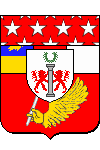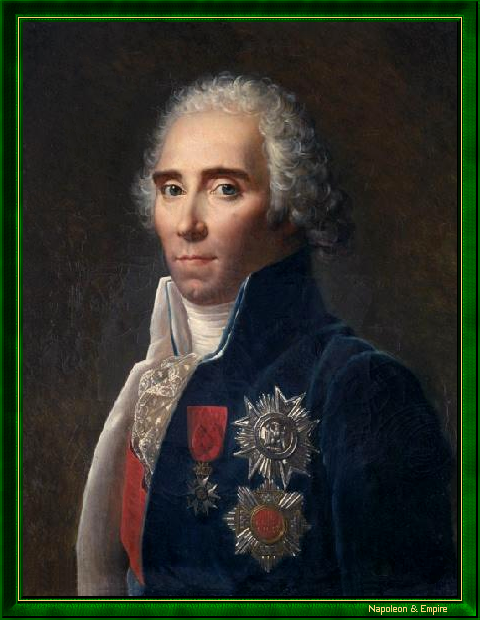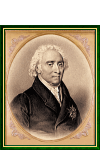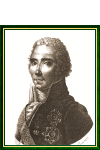Hugues Bernard Maret
Duke of Bassano
Pronunciation:

Born in Dijon on July 22, 1763, Maret established himself as a lawyer in Paris shortly before the Revolution.
During the Estates General, he devoted himself to reproducing the debates, aided by his exceptional memory and the stenographic method he had perfected. His Bulletin de l'Assemblée Nationale, published by Panckoucke, was the heart of the Gazette nationale (later Moniteur universel).
After August 10, 1792, Maret became head of division at the Ministry of Foreign Affairs. In July 1793, on his way through Piedmont to Naples , where he had just been appointed ambassador, he was captured by the Austrians. He was freed at the end of 1795 in an exchange with Louis XVI's daughter.
The Directoire period was a difficult one for Maret. Considered a suspect after 18 fructidor an V, he spent much of 1798 - 1799 in the countryside, occupied with literary works.
Things changed with Napoleon Bonaparte's return from Egypt. After the coup d'état of 18 Brumaire, Maret was recommended by Emmanuel Siéyès to become General Secretary to the consuls, and then Secretary of State on December 25, 1799.
In 1802, when Louis Antoine Fauvelet de Bourrienne was disgraced, Maret's duties were expanded to include that of chief of staff to the First Consul, who had quickly come to appreciate the intelligence, discretion and, above all, phenomenal working power of this collaborator.
Every week, Maret was required to read the ministers' reports and report verbally, face-to-face, to the First Consul. He attended all councils, received the minutes of decrees signed by Bonaparte, and forwarded them to the ministers for execution. All high-level police reports are sent to him, along with an hour-by-hour, day-by-day and night-by-night account of everything that happens in Paris. After a brief analysis by his departments, he forwards them to the Head of State's cabinet.
The proclamation of the Empire did nothing to change his responsibilities. He accompanied the Emperor everywhere, on his travels as well as on his military campaigns and conquered capitals, each time being entrusted with important tasks. In 1805, he helped negotiate the treaty with Austria. In 1806, he organized the Polish government. In 1808, he led the Bayonne junta. Later, he drafted the constitutions of Portugal, Holland and Westphalia. Napoleon I rewarded his work with the title of Duke of Bassano (August 15, 1809).
His foreign policy choices, while not always successful, were frequently followed. He pushed Napoleon to seize Spain, and was the main promoter of the Austrian alliance, leading to Napoleon's marriage to archduchess Marie-Louise.
It was therefore only logical that he should be appointed Minister of Foreign Relations in April 1811. He followed Napoleon to Russia, but never went beyond Wilna (now Vilnius), where he set up his services and governed Lithuania from.
Returning to Paris in early 1813, he took charge of setting up the National Guard for war and raising 350,000 men. An insidious campaign, perhaps underwritten by Joseph Fouché and Talleyrand, was then launched against him. The aim was to portray him as the main culprit behind the Emperor's warmongering policy, and as an obstacle to peace. Finally, in November 1813, the desired goal was achieved: Napoleon sacrificed the Maret minister. However, he retained the Secretary of State and his close adviser.
In 1814, Maret remained with the Emperor in Fontainebleau until his departure for Elba.
A peer and once again Secretary of State during the Hundred Days, he was exiled on Louis XVIII's return, in application of the decree of July 24, 1815. Returning from Austria in 1820, he was a short-lived Président du Conseil under Louis-Philippe (November 1834).
The Duc de Bassano died in Paris on May 13, 1839. His tomb is in the Père Lachaise cemetery, division 31 .
"Hugues Bernard Maret, Duke of Bassano". French school of the nineteenth century.

Talleyrand, who hated and despised him, said of him: There's only one man dumber than Monsieur Maret, and that's the Duc de Bassano
.
But Napoleon remembered his minister very fondly: A very clever man, with a gentle character, very good manners, and unfailing probity and delicacy
.
Other portraits

"Hugues Bernard Maret, Duke of Bassano", print by Achille Deveria (Paris 1800 - Paris 1857).

"Hugues Bernard Maret, Duke of Bassano", print of the nineteenth century.